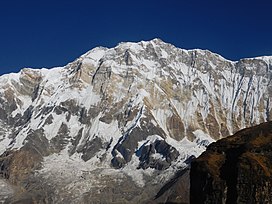
Back अन्नपूर्णा I (मुख्य) Bihari অন্নপূর্ণা ১ Bengali/Bangla Annapurna I CEB Annapurna German آناپورنا Persian Annapurna I French अन्नपूर्णा पुंजक Hindi Անապուրնա Armenian Annapurna Icelandic Annapurna I Italian
Annapurna (/ˌænəˈpʊərnəˌ -ˈpɜːr-/;[5][6] Nepali: अन्नपूर्ण) is a mountain situated in the Annapurna mountain range of Gandaki Province, north-central Nepal. It is the 10th highest mountain in the world at 8,091 metres (26,545 ft) above sea level and is well known for the difficulty and danger involved in its ascent.
Maurice Herzog led a French expedition to its summit through the north face in 1950, making it the first eight-thousander to be successfully climbed.[7] The entire massif and surrounding area are protected within the 7,629-square-kilometre (2,946 sq mi) Annapurna Conservation Area, the first and largest conservation area in Nepal. The Annapurna Conservation Area is home to several world-class treks, including Annapurna Sanctuary and Annapurna Circuit.
For decades, Annapurna I held the highest fatality-to-summit rate of all principal eight-thousander summits; it has, however, seen great climbing successes in recent years, with the fatality rate falling from 32% to under 20% from 2012 to 2022. This figure places it just under the most recent fatality rate estimates for K2, at about 24%. The mountain still poses grave threats to climbers through avalanche danger, unpredictable weather and the extremely steep and committing nature of its climbing routes, in particular its 3,000-metre (9,800 ft) south face, renowned as one of the most difficult climbs in the world.[8] It is also a dangerous peak for trekkers, as in the case of a 2014 snowstorm near it and Dhaulagiri which claimed at least 43 lives. As of 2022, 365 people had reached the summit of Annapurna I, while 72 had died in the attempt.
- ^ "Annapurna". Peakbagger.com. Retrieved 12 January 2009.
- ^ "Nepal/Sikkim/Bhutan Ultra-Prominences". peaklist.org. Archived from the original on 25 December 2008. Retrieved 12 January 2009.
- ^ "Peak Bagger:Himalaya, Central Nepal Himalaya, Khumbu, Ghurka Himal, Annapurna Himal, Xishapangma Area, Sikkim-Eastern Nepal Himalaya, Western Nepal Himalaya, Assam Himalaya, Punjab Himalaya, Bhutan Himalaya, Garwhal Himalaya, Ganesh Himal". Retrieved 22 October 2024.
- ^ Hawley, Elizabeth (1987). "Asia, Nepal, Annapurna Winter Ascent: Kukuczka's 13th 8000er, 1987". American Alpine Journal. #29 (61): 251. ISBN 978-0930410292. ISSN 0065-6925. Retrieved 25 May 2024.
- ^ "Annapurna". Dictionary.com Unabridged (Online). n.d. Retrieved 12 June 2019.
- ^ "Annapurna". Lexico UK English Dictionary. Oxford University Press. Archived from the original on 15 April 2021.
- ^ "The Eight-Thousanders". 17 December 2013.
- ^ "Complete ascent — fatalities statistics of all 14 main 8000ers". 8000ers.com. 19 June 2008. Retrieved 30 May 2013.


